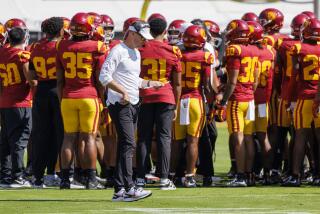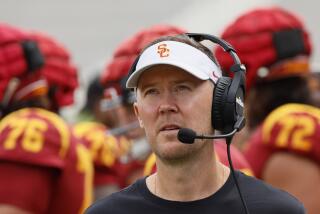Pardee Line: Hurry-Up Offense Works
- Share via
Football fans are often puzzled when they see a team that has struggled for 57 or 58 minutes zip down the field in the closing minutes with a hurry-up offense.
USC, for example, went 91 yards in a late rush to beat Washington State, 18-17, with a two-minute offense.
Coaches and players like to explain that the two-minute drill only works because of special circumstances--the defense is geared to stop the bomb so the sideline pass is available--but that it certainly couldn’t be used for an entire game.
The University of Houston would beg to differ. The Cougars are using the hurry-up offense as their basic attack and may be hurrying to all sorts of offensive records.
“We do it all the time,” said Houston Coach Jack Pardee of his run-and-shoot, hurry-up offense that spreads the field with four wide receivers.
Houston leads the nation by a wide margin in total offense, averaging 658.6 yards a game. The Cougars rank No. 1 in passing offense, with an average of 548 yards, and quarterback Andre Ware is the national leader in total offense with 423.3 yards a game.
Pardee, the former Ram and Redskin linebacker, concedes that Houston’s first three opponents--Nevada Las Vegas, Arizona State and Temple--were not comparable to the caliber of teams the Cougars will play the rest of the season.
“Our competition level changes drastically,” said Pardee, whose team will meet three Southwest Conference contenders this month--Baylor, Texas A & M and Arkansas.
Even so, Pardee says that he has a better team than last year’s, which had a 9-3 record and lost to Washington State in the Aloha Bowl.
Pardee, 53, has had an eclectic coaching career. He began with the Florida Blazers of the World Football League and moved on to the Chicago Bears and Washington Redskins of the National Football League, then the Houston Gamblers of the ill-fated United States Football League.
Along the way, he beat cancer, and in each league, except the WFL, Pardee has been named coach of the year at one time. He was so honored again last year in the Southwest Conference. That may be a record for varied recognition.
While he was with the Gamblers, Pardee brought in Mouse Davis, the innovator of the run and shoot, to establish that offense.
Pardee has stayed with it since he became Houston’s coach in 1987.
“Most teams devote 15 minutes of practice time to the hurry-up offense,” Pardee said. “That’s all we work on. We recruit for it and we get fast players. We have some legitimate sprinters. If you don’t have great team speed, you’re wasting your time with it.”
The offense baffled Arizona State a few weeks ago, when Houston set a Southwest Conference record with 744 yards in total offense on its way to a 36-7 victory.
“Many college defenses have to be concerned about stopping a running game with an eight-man front,” Pardee said. “Then, they face us and they have to worry about pass coverage and they don’t work on it all the time.
“Like, Arizona State. They’re a zone team. They didn’t have the ability to jump into man coverage, or do any blitzing effectively. We gave them a different picture than they face with other teams.”
Pardee said that Ware, a junior, is a super athlete who thrives on the work ethic, comparing him in that regard to his old Ram teammate, Roman Gabriel.
“He has a great arm and has the quality of quarterbacks I’ve had such as Joe Theismann and Jim Kelly,” Pardee said. “He has the temperament of a linebacker. He’s so tough that he just won’t be intimidated.”
Even though Houston is prospering on the field, it is laboring under National Collegiate Athletic Assn. sanctions based on infractions from the previous coaching regime.
The Cougars lost 10 scholarships and can’t appear on television or go to a bowl game this season. The sentence is less severe next season, with only a bowl ban.
As the nation’s 12th-ranked team, Pardee said Houston doesn’t have the depth of, say, Notre Dame or Miami.
“But we’d match up with them,” he said confidently.
It isn’t often that an Oregon-Washington State matchup has much significance in the Pacific 10 Conference race, or that both teams are nationally ranked.
However, the Northwest schools aren’t the doormats they once were in the league.
“I know Washington State will be emotionally very high coming off a very difficult defeat in a game they believe they deserved to win,” Oregon’s Coach Rich Brooks said of WSU’s loss to USC last Saturday.
“They’re an outstanding football team,” he said. “They can play with anyone in the country and defeat anyone in the country.”
The Cougars, who play the Ducks Saturday in Eugene, Ore., are ranked 21st nationally. Oregon is No. 23.
“It’s nice that some of the also-rans in past years, like us and Washington State, now are getting the national attention that we struggled hard to earn,” Brooks said.
Leave it to Lou Holtz to find something negative in an eased-up, 40-7 victory.
Speaking of his team’s win over Purdue, the Notre Dame coach said his reserves didn’t impress him.
“I’m glad we got to play a lot of people, but I was really disappointed that the second team didn’t have more continuity,” he said.
Other schools don’t have much continuity with their first teams.
Purdue Coach Fred Akers had a more accurate assessment of the top-ranked Irish.
“That’s the most talented group I’ve seen put together in a long, long time,” he said. “Maybe ever.”
Stanford, which has a 1-3 record, is next for the Fighting Irish. Just imagine what Holtz will be saying after that one.
Auburn Coach Pat Dye conceded that Tennessee has the inside track to win the Southeastern Conference championship after beating his Tigers last Saturday, 21-14.
“They ran the ball straight at us, and we couldn’t do a lot about it,” said Dye of Tennessee’s 350 yards rushing. “We were manhandled up front. That’s the worst we’ve been whipped in a long time.”
Rick Telander, in his book, “The Hundred Yard Lie,” which denounces the hypocrisy in college football, asked former UCLA Coach Pepper Rodgers why anyone would want to coach?
Said Rodgers: “Power. There’s no other job where you can yell, ‘Hit it,’ and a hundred men drop to the ground.”
Clarifying a rule: When USC kicked off to Washington State late in the second quarter of last Saturday’s game, the ball was recovered by the Trojans in the end zone.
Since a kickoff becomes a free ball after 10 yards, it was presumed by some that USC had scored a touchdown. Not so.
The rule: “The ball becomes dead and belongs to the team defending its goal when a free kick is untouched by team B (the receiving team) before touching the ground on or behind team B’s goal line.”
If USC had recovered the ball in the field of play, it would have retained possession.
More to Read
Fight on! Are you a true Trojans fan?
Get our Times of Troy newsletter for USC insights, news and much more.
You may occasionally receive promotional content from the Los Angeles Times.






